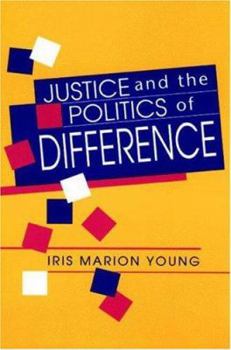Justice and the Politics of Difference
Select Format
Select Condition 
Book Overview
This book challenges the prevailing philosophical reduction of social justice to distributive justice. It critically analyzes basic concepts underlying most theories of justice, including impartiality, formal equality, and the unitary moral subjectivity. Starting from claims of excluded groups about decision making, cultural expression, and division of labor, Iris Young defines concepts of domination and oppression to cover issues eluding the distributive...
Format:Paperback
Language:English
ISBN:0691023158
ISBN13:9780691023151
Release Date:August 1990
Publisher:Princeton University Press
Length:296 Pages
Weight:0.97 lbs.
Dimensions:0.9" x 6.0" x 9.3"
Customer Reviews
2 ratings
This is the conversation we need to have
Published by Thriftbooks.com User , 23 years ago
Young's clasic book is most often read in seminars on social criticism and/or feminist studies. This is as it should be, for Young's work brilliantly illuminates the direction debates about justice and oppressed groups must go. However, I read the book from the point of view of the work of Warnke, Habermas, and Gadamer, more along the lines of hermeneutics and ideology critique. What I found was an absolutely riviting account of how we define the groups to which we belong, how we believe those groups interact with each other, and the way that the competing demands of these groups are met and dealt with. As Warnke does, Young realigns the concept of justice along a communitarian axis rather than an individualistic axis, proposing that we look at justice in terms of communitites than individuals. Only in this way will the individuals within those communities be able to come to the table with their respective concerns. Like Habermas, she investigates the rhetoric of power that underlies old ways of discussing justice in terms of distribution, denying that justice is a finite commodity that must be rationed. And like Gadamer, Young stresses the need for an understanding of presuppositions in developing theories of history and interpretation. After all, how we define "our" group in great part determines how we define "others".I found her turn from a rural to an urban paradigm of community to be nothing short of revolutionary. She develops an idea of community-oriented justice that revolves not around the model of self-suffient hamlets, but around the interlocking and often messy communities that exist side-by-side (though often in isolation from each other) in cities. Showing that the idea of self-sufficiency is unworkable in the curent context, Young holds out hope that these interconnected yet distinct communities will show us the way to not only survive but flourish in the postmodern world. Justice does not compete with difference; it grows out of it. An excellent study, it should be read by any and all, though the jargon cannot help but be technical at times. I agree with the previous reviewer, a good second-year book for students of social work, religion, philosophy, education, or politics, and a great any-time book for anyone concerned with issues of justice in the world today.
conceptual building blocks for a better world
Published by Thriftbooks.com User , 27 years ago
Iris Young makes us think about justice not as a set of debts we owe other individuals but as a set of relations between social groups. In a just society, no group is oppressed. Her chapter "Five Faces of Oppression" is a classic. She brings new insights to debates about welfare, affirmative action, and disability. This book also offers a thought-provoking discussion of community. Young argues that we have based our idea of community on the rural life of an earlier age and that city life is where we should look for ideas about how community thrives in diversity. Young tries to write for a general audience as well as for scholars. Sometimes, she succeeds, although the parts of the book that address particular groups and their predicaments or particular social policies are more accessible than the parts in which she critiques other theories. I would recommend this book for second-year students in college and up. It marks a turning point in social and political thought.






